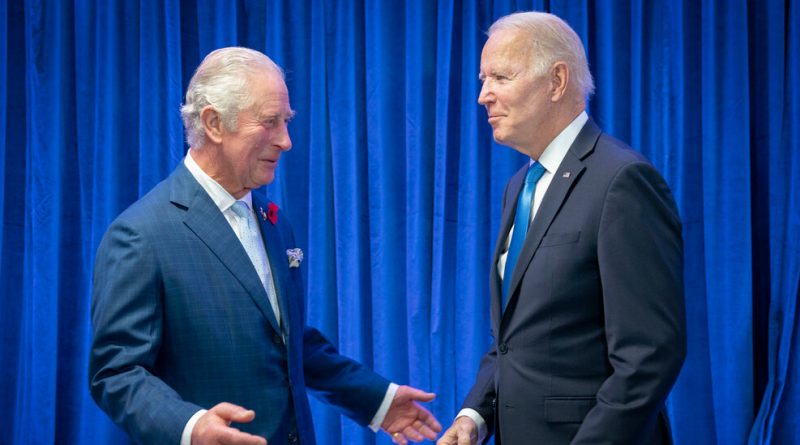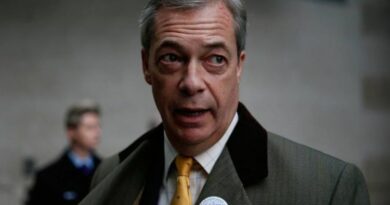For a President and a King, the View From the Top Is Curiously Similar
The two men — the American president and the British king — waited decades for their dream jobs, projecting a sense of normalcy and unity when they finally reached their thrones. They both prefer to ditch executive palaces for their respective retreats. And they share a passion for confronting threats to the environment.
The men, the 80-year-old President Biden and the 74-year-old King Charles III, are also united by their challenges. They both face a public increasingly dubious of their institutions. And they both battle skepticism over whether they are the right people to lead the increasingly diverse groups over which they preside.
“As older men in the pinnacle of their careers, they need to redefine what it means to be an older person,” said Arianne Chernock, a professor of history at Boston University and scholar of modern Britain, adding, “They need to find new ways to connect with a younger multicultural generation.”
That common ground will serve as the backdrop for the meeting between the president and the king on Monday at Windsor Castle, near London, where the two are expected to discuss clean-energy investment and efforts to combat climate change in developing nations. They are issues that Charles has been warning about since the 1970s and that Mr. Biden has made a central focus of his presidency.
Charles rallied leaders in Glasgow in 2021 to address climate change, warning them that “time has run out.” Mr. Biden has proclaimed the tax, energy and health bill that he signed into law last year as the “the biggest step forward on climate ever.”
Sally Bedell Smith, who has written numerous biographies about the British royal family, said those points of mutual interest could be useful. “Biden, I would guess, would have a lot of respect for what Charles has done and said” on the topic, she noted.
Both are also using the issue to connect more broadly with the public and, in Mr. Biden’s case, to galvanize voters.
Mr. Biden has struggled for most of his presidency with low approval numbers. A recent Reuters poll showed he had 41 percent approval, a marginal increase from the lowest level of his presidency but an indicator that voters remain unconvinced, particularly about his economic record.
Charles’s approval ratings have improved since he became king. He was viewed favorably by 55 percent of respondents in a recent poll by the market research firm YouGov. But that makes him only the fourth-most popular member of the royal family, trailing his son and heir, Prince William; his sister, Princess Anne; and his daughter-in-law, Catherine, Princess of Wales.
Mr. Biden and Charles have spent decades under the unforgiving glare of the public eye, finding respite in the familiar.
Mr. Biden flees the White House most weekends for one of his houses in the beachside town of Rehoboth Beach, Del. The king is said not to be particularly fond of Buckingham Palace. He and Queen Camilla live in the cozier Clarence House when they are in London and spend weekends at Highgrove, his countryside retreat in Gloucestershire.
They have a shared connection in struggle. Mr. Biden, who has navigated a stutter since his childhood, has said he was inspired by the film, “The King’s Speech,” which depicted the efforts of Charles’s grandfather, King George VI, to overcome similar speech problems.
Charles and the president have also faced heightened scrutiny over their complex relationships with their youngest sons. Mr. Biden’s adversaries have seized on Hunter Biden’s plea deal on two misdemeanor tax crimes to attack the president. The king’s relationship with Prince Harry has been in the spotlight since Harry and his wife, Meghan, withdrew from royal duties in 2020.
“They need to perform that job of being a father in an often public and glaring light,” Ms. Chernock, the history professor, said.
The president and the king are prone to break away from their prepared messaging. Mr. Biden recently called Xi Jinping, the top leader in China, a “dictator” even as his secretary of state, Antony J. Blinken, traveled to the country to try to smooth over strained relations with Beijing.
While royals are expected to steer clear of politics, the king’s political opinions have occasionally gotten him into trouble. After Charles attended the handover of Hong Kong in 1997, a London newspaper published extracts of a diary in which the king had written about goose-stepping Chinese soldiers and described the Chinese officials at the ceremony as “appalling waxworks.”
But the two men are also different in important respects.
The president is garrulous and extroverted, while the king is more contemplative and reserved. In his younger days, Charles was awkward and shy, seemingly ill-suited to a life in public. After decades of royal tours and receiving lines, he has become skilled in the art of small talk, though he is not the natural glad-hander that Mr. Biden is.
Charles’s intellectual pursuits can sometimes seem offbeat. A voracious reader and autodidact, Charles has burrowed into subjects like architecture, organic farming and conservation. He once proudly revealed that his Aston Martin sports car ran on a biofuel made from surplus white wine and cheese waste.
In contrast, Mr. Biden has a 1967 Corvette that runs on gas and often tries to relate to the working class by recalling his days commuting to Washington on the Amtrak.
The king is expected to abide by the traditions of the British monarchy that Mr. Biden has on multiple occasions refused to follow. Mr. Biden twice declined to bow to the king’s mother, Queen Elizabeth II, on the advice of his mother. “Don’t you bow down to her,” she told him, according to his memoir “Promises to Keep.” (There is no requirement that one must bow to the monarch — though many people follow the tradition as courtesy.)
During Mr. Biden’s four visits to the United Kingdom since becoming president, there has often been an undercurrent of tension.
In March, Mr. Biden made a brief stop in Northern Ireland to mark the 25th anniversary of the Good Friday Agreement before going to the Republic of Ireland for a much more leisurely tour of his ancestral roots. (As the London papers grumbled, Mr. Biden also has English roots.)
Mr. Biden did not attend the coronation of Charles in May, sending his wife, Jill, and their granddaughter Finnegan. When he called the king to send his regrets and offer congratulations, Charles invited the president to visit Britain, setting the stage for the Monday meeting that American officials are calling a “mini state visit.”
Even the logistics for this trip have not been without some static. The White House initially questioned the need for a stop at 10 Downing Street with Prime Minister Rishi Sunak, according to an official familiar with the planning, since the two men would meet at the NATO summit in Lithuania a day later. For Mr. Sunak, however, a handshake with the president in front of his residence is politically valuable, and the White House ultimately agreed to it.
The White House also yielded to the king’s request to welcome Mr. Biden at Windsor Castle, west of London, rather than at the more conveniently located Buckingham Palace. The palace is undergoing a multiyear renovation, and the official, told The New York Times that the king did not want Mr. Biden to see a construction site.
Asked about Mr. Biden’s skipping the coronation, Karine Jean-Pierre, the White House press secretary, rejected any notion that there was tension between the United States and Britain. (Historians point out that Dwight D. Eisenhower did not attend the 1953 coronation of Queen Elizabeth.)
“It’s important that the president is going to go out there, and he’s going to have a meeting with not just the king, but also the prime minister,” Ms. Jean-Pierre said. “That’s what you’re going to see: continuing a partnership with the United Kingdom.”
Those who have observed the relationship between the White House and the Royal family said the common ground shared by Charles and Mr. Biden would probably ensure a cordial meeting.
“They’ve both been to this rodeo many times,” Ms. Bedell Smith said.
Zolan Kanno-Youngs is a White House correspondent covering a range of domestic and international issues in the Biden White House, including homeland security and extremism. He joined The Times in 2019 as the homeland security correspondent. More about Zolan Kanno-Youngs
Mark Landler is the London bureau chief. In three decades at The Times, he has been bureau chief in Hong Kong and Frankfurt, White House correspondent, diplomatic correspondent, European economic correspondent, and a business reporter in New York. More about Mark Landler
Source: Read Full Article


